

We present to you our favorite food flicks so that you can hold your own Food Film Festival, every night of the week. Photo by Simon Carlsson.
June 2006
|
 |
Films About Food
In Alphabetical Order
Make sure the popcorn-maker is handy. These movies will make your mouth water.
Each of these films is either all about food, or has a memorable food scene. There’s no need to go out to a film festival: you can buy or rent some of these films and create your own, with food to match! For example:
- Chinese food with Eat, Drink, Man Woman, Spicy Love Soup and The Wedding Banquet.
- Mexican food with Tortilla Soup, Like Water For Chocolate and Woman On Top.
- Lobster with Annie Hall.
Click here to tell us about your favorite food films or food scenes. Click one of the letters below for the films. This isn’t an exhaustive list, so check our other Food Film articles for more great films!
Click here to jump to films by letter without having to scroll down.
a b c d e f g h i j k l m n o p q r s t u v w x y z
|
|
301- 302
“301-302 explores the mysterious disappearance of one of two young women who live across the hall from each other in a modern apartment complex in Seoul, Korea. The women, referred to by their apartment number, each share common yet dissimilar obsessions. Official Selection of the Sundance Film Festival and the Berlin International Film Festival.” —From Amazon.com
Click here to purchase the DVD.
|
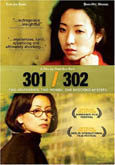
|
9 1/2 Weeks
“Frequently given short shrift as a blue movie (which it is) and as mindless (which it isn’t), director Adrian Lyne’s follow-up to Flashdance (insert own joke here) is a thoughtful, smutty film about a bad sexual relationship. It follows the two-month affair between Elizabeth, an art-gallery dealer, and John, a Wall Street exec. The relationship spirals downward into raunchier sex (filmed, by the way, quite nicely) but principally is about two adults doing adult things but not acting anything like real adults. Attempts at actual human connection, about the longing to be “good,” are present here and make this an above-average erotic film. Rourke is just honing his scumbag, bad-boy persona; but it doesn’t overwhelm. Lots and lots of Kim Basinger.” —Keith Simanton, from Amazon.com
Click here to purchase the DVD.
|
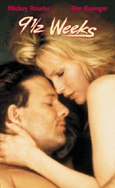 |
Age of Innocence
“Martin Scorsese does not sound like the logical choice to direct an adaptation of Edith Wharton's novel about manners and morals in New York society in the 1870s. But these are mean streets, too, and the psychological violence inflicted between characters is at least as damaging as the physical violence perpetrated by Scorsese's usual gangsters. At the center of the tale is Newland Archer (Daniel Day-Lewis), a somewhat diffident young man engaged to marry the very respectable May Welland (Winona Ryder). But Archer is distracted by May's cousin, the Countess Olenska (a radiant Michelle Pfeiffer), recently returned from Europe. As a married woman seeking a divorce, the countess is an embarrassment to all of New York society. But Archer is fascinated by her quick intelligence and worldly ways. Scorsese closely observes the tiny details of this world and this impossible situation; this is a movie in which the shift of someone's eyes can be as significant as the firing of a gun. The director's sense of color has never been keener, and his work with the actors is subtle. That's Joanne Woodward narrating, telling us only as much as we need to know—which is one reason why the climax comes as such a surprise.”—Robert Horton, from Amazon.com
Click here to purchase the DVD.
|
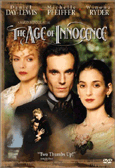 |
Alice Doesn’t Live Here Anymore
“Having scored a critical triumph with Mean Streets, Martin Scorsese accepted Alice Doesn’t Live Here Anymore as his first big-studio assignment, proving his versatility and further advancing his promising career. Hot off The Exorcist with her choice of projects at Warner Brothers, Ellen Burstyn sought a hot young talent (Scorsese was recommended by Francis Coppola) to direct Robert Getchell’s fine, sensitive screenplay about Alice Wyatt, a newly-widowed 35-year-old lounge singer with a bratty 12-year-old son (Alfred Lutter) and a very uncertain future. Her pursuit of broken dreams lands her a waitressing job in an Arizona diner, where she befriends foul-mouthed Flo (Diane Ladd) and meets and falls in love with a divorced farmer (Kris Kristofferson). With absolute authenticity of emotion and incident, Alice—which earned Burstyn a well-deserved Oscar® and features supporting roles for future Taxi Driver costars Jodie Foster and Harvey Keitel—conveys a then-timely sense of strength and endurance from a single mother in desperate times. There have been several similar dramas made since 1974, but Alice (which inspired the popular TV sitcoms Alice and Flo) is still the best. Trivia buffs: Look closely for Ladd’s daughter—a very young Laura Dern—and Scorsese as background extras in the diner scenes.”—Jeff Shannon, from Amazon.com
Click here to purchase the DVD. |
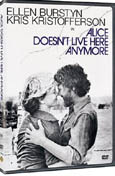 |
Alice’s Restaurant
“You can get anything you want there, or so went Arlo Guthrie’s song, a lengthy monologue about a Thanksgiving dinner and how its aftermath kept Guthrie out of the Vietnam-era draft. Arthur Penn’s movie version, which stars Guthrie, James Broderick, and Pat Quinn, has a shambling, good-natured feel, much like Guthrie’s epic tall tale. But as it follows Guthrie’s adventures (he gets arrested for improper disposal of Thanksgiving garbage and the arrest renders him unfit for military service, in the draft board’s eyes), it also examines the freewheeling nature of relationships in that period—and the toll that freedom took on those relationships. Guthrie is a natural performer, particularly funny during the draft board sequence; but the heart of the film is Quinn and Broderick’s troubled marriage.” —Marshall Fine, from Amazon.com
Click here to purchase the DVD.
|
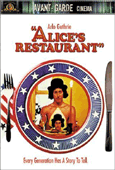 |
Alive
“In 1972 a chartered plane carrying a Uruguayan rugby squad and various family members crashed in the Andes. If that sounds dry and matter-of-fact, you haven’t seen director Frank Marshall’s harrowing re-creation Alive, an adrenaline-pounding, heart-in-your-mouth spectacle that kicks off this famous story of survival. The real-life against-all-odds odyssey made worldwide headlines when it became known that the survivors ate their own dead to survive. What could have easily become sensationalistic exploitation is treated with compassion and dignity by Marshall as he explores their moral and spiritual struggles as well as their physical ordeal. As team captain and base-camp cheerleader Vincent Spano slowly collapses under the stress and Ethan Hawke rouses from mourning his dead family to taking charge of saving himself, it also becomes a portrait in leadership, hope, and emotional courage.”—Sean Axmaker, from Amazon.com
Click here to purchase the DVD. |
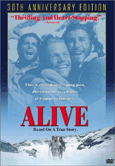 |
L’Aile ou la Cuisse
“In this comedy, Louis de Funes is a top restaurant critic, the head of an important French culinary guide. At the beginning of the film, he and his son (Coluche) are at odds, as the son prefers working as a circus clown to studying the fine arts of gastronomy. The two join forces, however, to thwart the greedy owner of a chain of inferior restaurants, who plans to take over the finest restaurants in France and substitute his formulaic fodder for real cooking. Another lure bringing the son into the picture is a lovely secretary working for the guide.”—from Amazon.com |
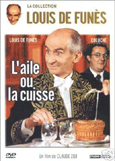 |
Annie Hall
“Annie Hall is one of the truest, most bittersweet romances on film. In it, Allen plays a thinly disguised version of himself: Alvy Singer, a successful—if neurotic—television comedian living in Manhattan. Annie (the wholesomely luminous Dianne Keaton) is a Midwestern transplant who dabbles in photography and sings in small clubs. When the two meet, the sparks are immediate—if repressed. Alone in her apartment for the first time, Alvy and Annie navigate a minefield of self-conscious “is-this-person-someone-I’d-want-to-get-involved-with?” conversation. As they speak, subtitles flash their unspoken thoughts: the likes of “I’m not smart enough for him” and “I sound like a jerk.” Despite all their caution, they connect, and we’re swept up in the flush of their new romance. Allen’s antic sensibility shines here in a series of flashbacks to Alvy’s childhood, growing up, quite literally, under a rumbling roller coaster. His boisterous Jewish family’s dinner table shares a split screen with the WASP-y Hall’s tight-lipped holiday table, one Alvy has joined for the first time. His position as outsider is uncontestable he looks down the table and sizes up Annie’s “Grammy Hall” as “a classic Jew-hater.”
The relationship arcs, as does Annie’s growing desire for independence. It quickly becomes clear that the two are on separate tracks, as what was once endearing becomes annoying. Annie Hall embraces Allen’s central themes—his love affair with New York (and hatred of Los Angeles), how impossible relationships are, and his fear of death. But their balance is just right, the chemistry between Allen’s worry-wart Alvy and Keaton’s gangly, loopy Annie is one of the screen’s best pairings. It couldn’t be more engaging.”—Susan Benson, from Amazon.com
Click here to purchase the DVD.
|
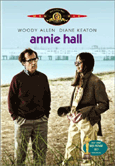 |
Attack of the Killer Tomatoes
“Movies with “wacky” titles are almost never any good, and Attack of the Killer Tomatoes! was intentionally made to be an instant golden turkey. Despite that, and the grade-Z production values, this is a regularly funny film. You need to be a fan of the kind of low-budget horror movie it’s spoofing, and you need to be very forgiving of the technical ineptness and frequent clunkers, but it works. The story? Well, tomatoes attack, basically. Jack Riley and the San Diego Chicken are in it, and that genuinely alarming helicopter crash you see in an early scene was a real accident. Seen now, the whole ratty affair brings back agreeable memories of the circa-1978 college-movie/midnight-cinema era, when seeing this film was virtually unavoidable. The sequel, Return of the Killer Tomatoes! (with a young George Clooney), is actually an even funnier film. Director John De Bello would continue to squeeze the Tomatoes franchise for years to come.”—Robert Horton, from Amazon.com
Click here to purchase the DVD. |
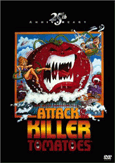 |
Au Petit Marguery
“A group of friends and regulars gather for dinner at the last night of a restaurant and reminisce.”—from Amazon.com
Click here to purchase the VHS tape (French with no subtitles). |
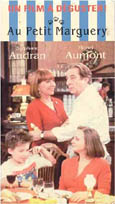 |
Auntie Lee’s Meat Pies
“A woman sends her four nieces to bring home boys to turn into ground meat.”—from Amazon.com |
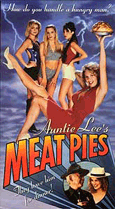 |
Autumn in New York
“Autumn in New York is a by-the-numbers love story, right down to its opening shot of, yes, autumn in New York. Richard Gere stars as restaurateur/lady’s man Will, while Winona Ryder plays the airy-fairy, oh-too-delicate-for-this-world Charlotte. Will is 48, Charlotte is 22, and it just keeps getting creepier: Will actually used to hang out with Charlotte’s mom. She plays artily with beads and sparkly things, he notices how elfin and different she is (inspiring such stomach-churning dialogue as “I find you completely unprecedented and therefore utterly unpredictable”), and soon they’re in love. Ah, but it’s doomed: she has a tumor in her heart (just in case you missed the significance, Charlotte says “I’m sick in my heart!”). Does Charlotte have enough time left to teach Will to truly love? While Gere does a stoic job, Ryder spends a lot of time being darling and winsome, aided by the fact that Charlotte has managed to catch one of those special movie diseases where you never look bad or get tubes stuck up your nose. Director Joan Chen doesn’t have much of a script to work with, but at least she knows how to pick a cinematographer; the whole movie is shot in gorgeous fall-leaf colors. Several excellent supporting actors are trapped in this movie: Jill Hennessey and Anthony LaPaglia do their very best, but what can they do in the face of such a sweeping, creepy love? Autumn in New York is nothing if not an earnest movie, and it certainly means well. Much like Charlotte, it seems to cry, “Can you let me love you? Please? No”. —Ali Davis, from Amazon.com
Click here to purchase the DVD. |
 |
Autumn Moon
“An odd, offbeat relationship develops between a Japanese man in his mid 20s with a serendipitous encounter with a Chinese high school girl. He, speaking Japanese, and she, only knowing Chinese, communicate in awkward, broken English to discover more in common than one might think. His search for good food ends at her grandmother’s house, who is a wonderful cook.” —Melissa Hom
Click here to purchase the VHS tape. |
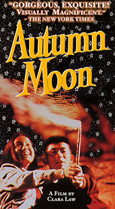 |
Babette’s Feast
“Some movies can only be described as delicious. In Babette’s Feast, a woman flees the French civil war and lands in a small seacoast village in Denmark, where she comes to work for two spinsters, devout daughters of a puritan minister. After many years, Babette unexpectedly wins a lottery, and decides to create a real French dinner—which leads the sisters to fear for their souls. Joining them for the meal will be a Danish general who, as a young soldier, courted one of the sisters, but she turned him away because of her religion. The village elders all resolve not to enjoy the meal, but can their moral fiber resist the sensual pleasure of Babette’s cooking? Babette’s Feast deservedly won the 1987 Academy Award for Best Foreign Language Film. This lovely movie is impeccably simple, yet its slender narrative contains a wealth of humor, melancholy, and hope.”—Bret Fetzer, from Amazon.com
Click here to purchase the DVD. |
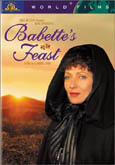 |
Bandits
“Chemistry and quirkiness—and a stellar cast—help make Barry Levinson’s Bandits more than just another comedy about ill-matched outlaws. Levinson’s deft touch in Rain Man is evident in the film’s road-movie structure, which follows bank robbers Joe (Bruce Willis) and Terry (Billy Bob Thornton) on a crime spree from Oregon to California. They’re eventually joined by an aspiring stuntman and getaway driver (Troy Garity, son of Jane Fonda) and a neglected housewife (Cate Blanchett) who falls in love with both Joe and Terry after escaping her boring marriage. As scripted by Twin Peaks alumnus Harley Peyton, Bandits shifts from character comedy to crime thriller with reckless abandon, and the humor (particularly Terry’s multiple neuroses) is occasionally forced and flat. Levinson compensates with offbeat moments of unexpected tenderness, allowing his cast to express depths of character not necessarily found in the script. A twist ending won’t surprise attentive viewers, but it gives Bandits the extra kick it needs.” —Jeff Shannon, from Amazon.com
Click here to purchase the DVD. |
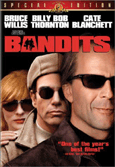 |
Bella Marta (Mostly Martha)
“Mostly Martha is a rich addition to the recent banquet of movies about food. Martha (Martina Gedeck), the domineering chef at a fancy restaurant, has her rigid routine broken when her sister dies in a car wreck, leaving behind her 9-year-old daughter Lina (Maxime Foerste). Martha takes the girl in, but has no gift for maternal expression; she offers Lina food, but Lina refuses to eat. Meanwhile, her control over her kitchen is threatened when her boss hires a buoyant Italian named Mario (Sergio Castellitto) to assist, and Martha finds herself flailing in an effort to reestablish control of her life. While Mostly Martha may not hold many surprises, the writing, direction, and particularly the acting are as sumptuous and sensual as the cooking and eating. The relationship between Martha and Lina is portrayed with all its awkwardness and complications intact; the result is wonderfully affecting.” —Bret Fetzer, from Amazon.com
Click here to purchase the DVD. |
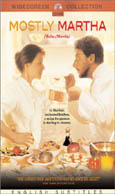 |
Big Night
“Critics tripped all over their big feet to praise Big Night, and in doing so performed a grave disservice to this fine little film. They fooled audiences into believing it was a “super movie” instead of a home movie buoyed by friends and family. Consequently, many viewers were disappointed. Big Night is an intimate look at the immigrant struggle to attain the American Dream, set in New Jersey in the 1950s. Its disproportionate success gave co-directors Stanley Tucci and Campbell Scott, who also star in the picture, the green light to follow up with a smug, unsuccessful second venture called The Imposters. Tucci wrote Big Night with his cousin Joseph Tropiano, and they based the story on the experience of growing up in a large, proud Italian family. The brothers in Big Night—chef Primo (Tony Shalhoub) and businessman Secondo (Tucci)—have come to New Jersey to open a bistro named The Paradise that serves the finest in traditional, authentic Italian cuisine. Their every move is foiled by rival restaurant Pascal’s, which serves mile-high servings of spaghetti and meatballs and flasks of bad Chianti at exorbitant prices. Primo is disgusted by the fact that Americans want cheap pasta instead of risotto, so Secondo hatches a plan to boost business: rumor has it bandleader Louis Prima is traveling through and will dine at The Paradise that very night. Secondo gambles to bring the finest dinner ever cooked—at the risk of losing his shirt and being reduced to exile to the old country with his tail between his legs. Big Night is a film that will easily invite comparisons to other “food” fare like Babette’s Feast and Eat Drink Man Woman but, though Tucci insists his story is “about the struggle between art and commerce and the risk of staying true to yourself,” the media refused to let it stay a small, comparative work. The movie, and the buzz around it, became a parable for the essence of the film itself: art vs. commerce.” —Paula Nechak, from Amazon.com
Click here to purchase the DVD. |
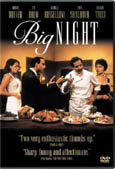 |
Catfish in Black Bean Sauce
“Dwayne and his sister are Vietnamese siblings who were adopted by an African-American couple. Now in their mid-20s, they both have chosen different paths, but when they learn that their biological mother is coming to Los Angeles, they eagerly await the reunion. This drama is both funny and moving in an emotionally rewarding journey through the tapestry of one group of immigrants searching for what it means to call themselves a family.”—from Amazon.com
Click here to purchase the DVD. |
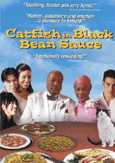 |
Charlie and the Chocolate Factory
“Mixed reviews and creepy comparisons to Michael Jackson notwithstanding, Tim Burton’s splendidly imaginative adaptation of Charlie and the Chocolate Factory would almost surely meet with Roald Dahl’s approval. The celebrated author of darkly offbeat children’s books vehemently disapproved of 1971’s Willy Wonka and the Chocolate Factory (hence the change in title), so it’s only fitting that Burton and his frequent star/collaborator, Johnny Depp, should have another go, infusing the enigmatic candyman’s tale with their own unique brand of imaginative oddity. Depp’s pale, androgynous Wonka led some to suspect a partial riff on that most controversial of eternal children, Michael Jackson, but Burton’s film is too expansively magnificent to be so narrowly defined. While preserving Dahl’s morality tale on the hazards of indulgent excess, Burton’s riotous explosion of color provides a wondrous setting for the lessons learned by Charlie Bucket (played by Freddie Highmore, Depp’s delightful costar in Finding Neverland), as he and other, less admirable children enjoy a once-in-a-lifetime tour of Wonka’s confectionary wonderland. Elaborate visual effects make this an eye-candy overdose (including digitally multiplied Oompa-Loompas, all played by diminutive actor Deep Roy), and the film’s underlying weirdness is exaggerated by Depp’s admirably risky but ultimately off-putting performance. Of course, none of this stops Burton’s Charlie from being the must-own family DVD of 2005’s holiday season, perhaps even for those who staunchly defend Gene Wilder’s portrayal of Wonka from 34 years earlier.”—Jeff Shannon, from Amazon.com
Click here to purchase the DVD. |
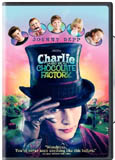 |
A Chef in Love
“A French chef falls in love with Georgia (the country, not the state) and its cultural dishes during the rise of the Soviets.”—Melissa Hom
Click here to purchase the VHS tape. |
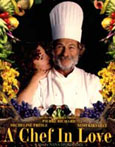 |
Chicken and Duck Talk (Gai Tung Aap Gong)
“Also known as Chicken and Duck Speak, Chicken and Fast Food, or Ji Tong Ya Jiang (Mandarin title). This Cantonese film is a classic comedy about what happens when Danny Chicken, an American-fast food chicken joint opens across the street from a Hong Kong duck shop.”—Melissa Hom
|
 |
The Chinese Feast
“After accepting a cooking challenge at the Imperial Feast (a three-day culinary showdown), Chui Kong Sun and Au Ka Wai search for a chef who can cook for the challenge. The man they are looking for was a renowned chef but is now an alcoholic. In addition to watching sweet and sour pork and fried noodles with pork being prepared, the Iron Chef-esque challenge requires the following ingredients: bear palm, elephant trunk, and monkey brains.”—Melissa Hom
Click here to purchase the DVD. |
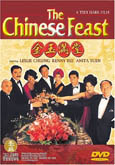 |
Chitty Chitty Bang Bang
“This remastered, pan-and-scan 30th-anniversary edition of that kiddie-car caper is flawed but solid family fare. It retains a quaint charm while some of the songs—including the title tune—are quite hummable. A huge plus is Dick Van Dyke, who is extremely appealing as an eccentric inventor around the turn of the century. With nimble fingers and a unique way of looking at the world, he invents for his children a magic car that floats and flies. Or does he? The special effects are tame by today’s standards, and the film is about 20 minutes too long—but its enthusiasm charms. The script was cowritten by Roald Dahl and based on the novel by Ian Fleming, best known for his James Bond adventures.”—Rochelle O’Gorman, from Amazon.com
Click here to purchase the DVD.
|
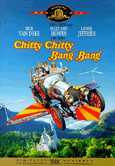 |
Chocolat
“With movies like Chocolat, it’s always best to relax your intellectual faculties and absorb the abundant sensual pleasures, be it the heart-stopping smile of chocolatier Juliette Binoche as she greets a new customer, an intoxicating cup of spiced hot cocoa, or the soothing guitar of an Irish gypsy played by Johnny Depp. Adapted by Robert Nelson Jacobs from Joanne Harris’s popular novel and lovingly directed by Lasse Hallström, the film covers familiar territory and deals in broad metaphors that even a child could comprehend, so it’s no surprise that some critics panned it with killjoy fervor. Their objections miss the point. Familiarity can be comforting and so can easy metaphors when placed in a fable that’s as warmly inviting as this one.
Driven by fate, Vianne (Binoche) drifts into a tranquil French village with her daughter Anouk (Victoire Thivisol, from Ponette) in the winter of 1959. Her newly opened chocolatier is a source of attraction and fear, since Vianne’s ability to revive the villagers’ passions threatens to disrupt their repressive traditions. The pious mayor (Alfred Molina) sees Vianne as the enemy, and his war against her peaks with the arrival of “river rats” led by Roux (Depp), whose attraction to Vianne is immediate and reciprocal. Splendid subplots involve a battered wife (Lena Olin), a village elder (Judi Dench), and her estranged daughter (Carrie-Anne Moss), and while the film’s broader strokes may be regrettable (if not for Molina’s rich performance, the mayor would be a caricature), its subtleties are often sublime. Chocolat reminds you of life’s simple pleasures and invites you to enjoy them.”—Jeff Shannon, from Amazon.com
Click here to purchase the DVD. |
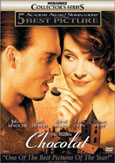 |
Christmas in Connecticut
“Christmas in Connecticut is a holiday film that plays 365 days of the year. Barbara Stanwyck gives a brilliant, sardonic performance as Elizabeth Lane, a columnist for Smart Housekeeping magazine, whose enticing descriptions of the exquisite meals she prepares for her husband and baby on their bucolic Connecticut farm earns her fame as “America’s Best Cook.” A writer, she is; a cook, she is not. As she types the words, “From my living room window, as I write, the good cedar logs cracking on the fire...” the view is of clothes flapping on the line outside her bachelorette Manhattan apartment. An able supporting cast keeps her lie on life support: her editor, her stuffy and detestable architect suitor, and the wonderful “Uncle” Felix (S.Z. Sakall), an English-garbling Hungarian chef who provides the recipes that fill her column.
Cut to Jefferson Jones, a sailor adrift at sea for weeks after his destroyer is torpedoed. Memories of the food described in Lane’s columns are central to his survival. After his rescue, as he’s recuperating in a naval hospital, a marriage-minded nurse thinks she might nudge Jones to the altar if he could only experience a real domestic Christmas. And it just so happens that she was nurse to the grandchild of Alexander Yardley, the wealthy and powerful publisher of —you guessed it—Smart Housekeeping magazine. And so, she pens the letter that could unravel Lane’s carefully constructed fraud. She writes to Yardley asking that Jones be included in America’s ultimate Christmas—the one to be held at the Lane family farm in Connecticut. The pompous Yardley (ably portrayed by Sidney Greenstreet) believes the Lane myth and instantly sniffs a story that will send his magazine’s circulation skyrocketing. And staring down a lonely holiday, he decides to join the Lanes for Christmas on the farm, too. Now, all Lane has to do is come up with a farm. And a husband. And let’s not forget the baby. Christmas in Connecticut is classic screwball entertainment of the best kind, with its on-target skewering of social convention and house-of- cards-about-to-tumble tension: a perfect farcical vision of domestic blitz.”—Susan Benson, from Amazon.com
Click here to purchase the DVD.
|
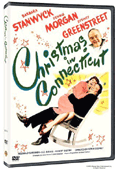 |
The Cook, The Thief, His Wife & Her Lover
“Few directors polarize audiences like Peter Greenaway, a filmmaker as influenced by Jacobean revenge tragedy and 17th century painting as by the French New Wave. The Cook, the Thief, His Wife and Her Lover is both adored and detested for its combination of sumptuous beauty and revolting decadence. A vile, gluttonous thief (Michael Gambon, The Singing Detective) spews hate and abuse at a restaurant run by a stoic French cook (Richard Bohringer, Diva), but under the thief’s nose his wife (the ever-sensuous Helen Mirren, Prime Suspect) conducts an affair with a bookish lover (Alan Howard, Strapless). Clothing (by avant-garde designer Jean-Paul Gaultier) changes color as the characters move from room to room. Nudity, torture, rotting meat, and Tim Roth (Reservoir Dogs) at his sleaziest all contribute the atmosphere of decay and excess. Not for everyone, but for some, essential.”—Bret Fetzer, from Amazon.com
Click here to purchase the DVD. |
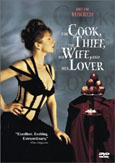 |
Cousin, Cousine
“One of the first, and most successful, French export comedies, Cousin Cousine garnered a Best Actress Oscar nomination for Marie-Christine Barrault, an international audience for director Jean- Charles Tacchella, and a substantial, surprising haul at American box offices in late 1975 and early ’76. Retrospectively, it’s not difficult to understand why: Barrault and costar Victor Lanoux prove themselves to be adept, protean comic actors, and Tacchella’s breezy pacing makes the witty, gag-laden script crackle with frenetic verve. Barrault and Lanoux play cousins (by marriage only; it isn’t quite that French) drawn together when their respective partners are caught philandering. Their initial friendship quickly blossoms into something altogether more scandalous. The narrative, framed by weddings, funerals, and other family get-togethers, feels surprisingly modern in its choice of milieu; indeed, recent comedies such as Four Weddings and a Funeral and My Best Friend’s Wedding owe a substantial debt to the whimsical tone of Cousin Cousine. More Hollywood than Cannes, it’s perhaps unsurprising that Tacchella’s comedy was recently remade into Cousins (1989), an intermittently amusing Ted Danson vehicle with occasional resemblances to its vastly superior predecessor.”—Miles Bethany, from Amazon.com
Click here to purchase the VHS tape. |
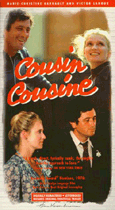 |
Crossing Delancey
“A sweet tempered urban love story, Crossing Delancey argues that true love may be in the first place you look. Amy Irving is a single Jewish woman working at an upscale bookstore on the Upper West Side of New York. As much as she longs to be a part of the intellectual literary scene, she is tethered to her roots on the Lower East Side, where her old-fashioned grandmother is forever trying to fix her up. Irving has her eye on a handsome brooding author, but her grandmother enlists the help of a local matchmaker to fix her up with Peter Riegert, a quiet Jewish man who runs a pickle stand in the neighborhood. Soon she must decide what it is she really wants out of life and what love really means to her. Though a very traditional love story, Crossing Delancey has its moments of soul searching drama and an unlikely romance.”—Robert Lane, from Amazon.com
|
 |
La Cuisine au Beurre (Cooking With Butter)
“In this comedy, a French prisoner of war (WWII) returns home to his wife and café after a decade to find her with another man – a chef who cooks with butter, while the POW cooks with oil.”—Melissa Hom |
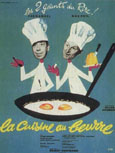 |
Cuisine Americaine
“French-born, UCLA-trained screenwriter Jean-Yves Pitoun made his directorial debut with this French comedy in which self-taught cook Lorenzo, aka Loren (Jason Lee) is discharged from the U.S. Navy after hitting a superior who accused him of serving “sissy food” to the Admiral’s guests. Back in Brooklyn, Loren works at his Italian-Irish family’s pizza parlor and then heads for France to study with his idol, chef Louis Boyer (Eddy Mitchell). After the death of his wife, Boyer raised his daughter Gabrielle (Irene Jacob), now a successful restaurant architect engaged to physician Vincent (Thibault de Montalembert). Gabrielle and Loren compare recipes and finally choose romance from their menu, while Boyer begins to cave in from the stress of tax problems, restaurant critics, and police seeking illegal foreign workers.”—from Amazon.com
|
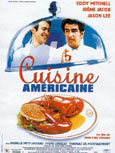 |
Daughters of the Dust
“Working with a theme and history that’s obviously dear to her heart, first-time writer-director Julie Dash’s exquisitely alive film chronicles the last days of the Gullah, an Americanized West African people in danger of losing their identity. Dash makes up for some overly schematic dialogue and an occasionally pokey pace with some strong performances (particularly Cora Lee Day as the sternly matriarchal Nana) and an absolutely wonderful visual sense (kudos should also go to her ace cinematographer Arthur Jafa, whose dazzlingly sumptuous imagery surely inspired Jonathan Demme’s later Beloved). A rapturously textured, wholly mesmerizing glimpse into the Gullah culture.”—Andrew Wright
Click here to purchase the DVD. |
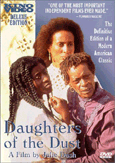 |
Delicatessen
“A post-apocalyptic future becomes the setting for pitch black humor in this visually intricate French comedy. The action takes place within a single apartment complex, which is owned by the same man that operates the downstairs butcher shop. It’s a particularly popular place to live, thanks to the butcher’s uncanny ability to find excellent cuts of meat despite the horrible living conditions outside. The newest building superintendent, a former circus clown, thinks he has found an ideal living situation. All that changes, however, when he discovers the true source of the butcher’s meat, and that he may be the next main course. This dark tale is played out in a brilliantly designed, glorious surreal alternate world reminiscent of the works of director Terry Gilliam, who co-presented the film’s American release. Like Gilliam, co-directors Jean-Pierre Jeunet and Marc Caro hail from an animation background, and have a fondness for extravagant visuals, absurdist plot twists, and a sense of humor that combines sharp satire with broad slapstick and gross-out imagery. This mixture may displease the weak of stomach, but those attuned to the film’s sensibility will be delighted by the obvious technical virtuosity and wicked sense of humor.”—from Amazon.com
|
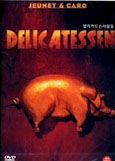 |
The Deli
“A “feel good” New York slice-of-life with an ensemble cast of favorites, “The Deli”, tells the engaging tale of Johnny Amico (Dumb & Dumber’s Mike Starr), a lovable but incorrigibly bad gambler who has a tough time paying the bills at his Italian-American delicatessen.
With one week to make good on his debts, Johnny rides a comic roller coaster as he desperately tries to save “The Deli” while battling a crazy bunch of bookies, gangsters and neighborhood nut jobs.”—from Amazon.com
Click here to purchase the DVD.
|
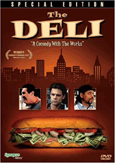 |
Diner
“Barry Levinson’s debut film as a writer-director nearly got lost in the shuffle before New York critics rescued it from oblivion. Set in his native Baltimore in 1959, it focuses on a group of pals coping with life post high school. Each of them has problems with women, it seems, whether it’s Steve Guttenberg (as a guy about to get married who forces his fiancée to pass a test about the Baltimore Colts), Mickey Rourke (as the womanizing hairdresser with a gambling problem), or Daniel Stern (as the married one who makes his wife miserable with his carefully cataloged record collection). The only time these guys seem like they have it together is when they gather at the diner to sling the bull. The cast includes Ellen Barkin, Timothy Daly, Paul Reiser, and Kevin Bacon—each in a breakthrough role.”—Marshall Fine, from Amazon.com
Click here to purchase the DVD.
|
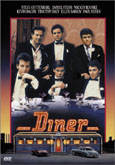 |
Dinner Rush
“Dinner Rush is gourmet cinema, served with a generous helping of culinary panache. After countless commercials, music videos (including Michael Jackson’s “Beat It”), and a few obscure features, director and restaurateur Bob Giraldi casts his own New York eatery as a TriBeCa hot spot where the owner (Danny Aiello) presides over a busy night of fine dining and mob entanglements. He’s been a bookmaker for 25 years but he’s going legit; his son (Edoardo Ballerini) is a nuovo cuisine genius, eager to inherit the business; the sous-chef (Kirk Acevedo) is deeply in debt to mafia thugs; an art-dealer snob (Mark Margolis) is antagonizing his waitress (Summer Phoenix); a charming stranger (John Corbett) harbors a climactic surprise; and a powerful food critic (Sandra Bernhard) is ready to pounce on any wrong move. In perfect control of this bustling environment, Giraldi directs like a great chef cooks: with Altmanesque delicacy, confident that every ingredient is vital to the success of his creation. It’s utterly delicious.”—Jeff Shannon, from Amazon.com
Click here to purchase the DVD. |
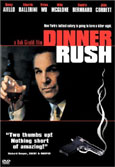 |
The Discreet Charm of the Bourgeosie
“What can be more enjoyable then a meal among friends and family? In Luis Buñuel’s surrealistic comedy The Discreet Charm Of The Bourgeoisie it is this common ritual a sextet of upper-class friends repeatedly attempt, only to be obstructed by one obscure event after another. Masterfully balancing the dichotomy of class vs. debauchery Buñuel delivers a ripping critique of the upper class. It is clear from the beginning that the lives Buñuel’s Bourgeoisie are living are not what they seem. Eventually, their true colors begin to shine; not in actual actions but in haunting dreams. What is real and what lies in the subconscious becoming exceedingly blurry and in order to deliver his message, surrealism must take over. It is hard to pigeonhole Buñuel’s classic that won him the Oscar for Best Foreign Language Film 1972: An absurd odyssey? A discreet satire? Not necessarily, but definitely charming.”—Rob Bracco
Click here to purchase the DVD. |
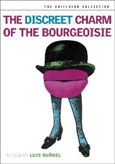 |
The Duchess of Duke Street
“From the golden age of Masterpiece Theatre comes this beloved 1976 British miniseries by the creators of Upstairs, Downstairs. Gemma Jones gives a performance for the ages in this rags-to-riches saga that charts the ascendancy of the indomitable Louisa Trotter, who rose from scullery maid to become “the finest cook in London” and Edwardian society’s premier hostess. Inspired by the true story of Rosa Lewis, who held court at her renowned Cavendish Hotel, The Duchess of Duke Street is the video equivalent of a good read. Immerse yourself in this lavishly mounted BBC production that impeccably re-creates a bygone era at the turn of the century and captivates viewers with the tragedies and triumphs of Louisa’s story, which includes an ill-fated affair with the Prince of Wales, an unhappy marriage, and struggles with bankruptcy and ill health. But Louisa, Cockney accent intact, prevails as the reigning mistress of Hotel Bentinck.”—Donald Liebenson, from Amazon.com
Click here to purchase the DVD. |
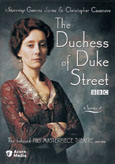 |
Earth to Mouth
“A film blending Lau King-Fai’s work on a farm raising Asian vegetables for the market and the changing face of agriculture in Ontario, Canada.” —Melissa Hom |
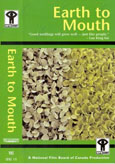 |
Eat a Bowl of Tea
“Director Wayne Wang is in his appealingly low-key groove with this wry comedy-drama, a precursor to his later success with The Joy Luck Club. It’s set in the aftermath of World War II, when the restrictive U.S. immigration laws had finally been relaxed. WWII vet Russell Wong is a young Chinese-American hepcat, strong-armed by his dad (the wonderfully gnarled character actor Victor Wong) into an arranged marriage with a Chinese girl (Cora Miao). The trip to China, and the atmosphere of New York’s Chinatown, are neatly mounted. The film’s central joke, and metaphor, is the bridegroom’s impotence after marriage; he’s cowed by the expectations of his traditional culture, which don’t necessarily match his own ideas. In its quiet way, Eat a Bowl of Tea examines the larger issues of ethnic identity while poking affectionate fun at its floundering characters—a distinctly modern attitude for a 1940s story.”—Robert Horton, from Amazon.com
Click here to purchase the DVD.
|
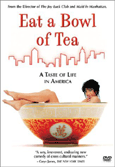 |
Eat Drink Man Woman
“This is not a movie to see on an empty stomach. Writer-director Ang Lee’s 1994 Oscar nominee tells a family story about a chef and his three daughters through the meals the chef prepares and serves his family. This touching, dryly funny story of a family coping with personal lives and the way those lives intersect with the family relationships captures a shift in generations in Taipei. The father, a famous chef who has lost his taste buds, still cooks, though he draws no pleasure from eating. His daughters, meanwhile, deal with both the disappointments and surprises of daily living and the way their adult lives compare to the expectations the widowed father had for them. A subtle, amusing and mouth-watering—comedy of impeccable manners.”—Marshall Fine, from Amazon.com
Click here to purchase the DVD. |
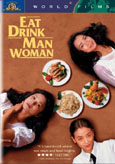 |
Eat This New York
“Eat This NY is a documentary about 2 best friends struggling to open a bistro in Brooklyn. Suffering through financial crisis and a crumbling friendship, the two friends learn what it really takes to open and run a restaurant.
As a foil to these novices, the filmmakers turn their camera on legends of the NY food world, going behind the scenes at Le Cirque, Balthazar, Gramercy Tavern, Jean Georges, and other four star eateries. Candid conversations with Daniel Boulud, Danny Meyer, Keith McNally and many more food legends illuminate the trials and joys of what it’s like to succeed in the restaurant world.
Tim Zagat (Zagat Survey) and Ruth Reichl (Gourmet Magazine) lend sobering analysis to the proceedings.”—from Amazon.com
Click here to purchase the DVD. |
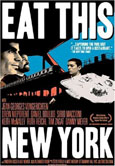 |
Eating Raoul
“You’d think a black comedy about murder, tackiness, and sexual perversion would quickly become dated, but Eating Raoul (1982) feels surprisingly fresh and delightful. When Mary Bland (Mary Woronov) gets assaulted by one of the repulsive swingers from the neighboring apartment, her husband Paul (Paul Bartel) rescues her with a swift blow from a frying pan—only to discover a substantial wad of cash in the swinger’s wallet. A lure-and-kill scheme follows, which nicely fills their nest egg until a slippery thief named Raoul (Robert Beltran of Star Trek: Voyager, making his film debut) stumbles onto the truth and insists on getting a share. When Raoul starts demanding a share of Mary as well, Paul has to take drastic steps. The key to Eating Raoul isn’t the sensational content, but the blithe, matter-of-fact attitude Bartel and Woronov take to it; their sly underplaying makes the movie sparkle with wicked wit.”—Bret Fetzer, from Amazon.com
Click here to purchase the DVD. |
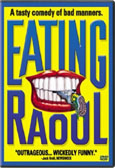 |
Ermo
“A humble and remote Chinese noodle street vendor cares for her disabled husband and son. When a neighbor buys a television, Ermo’s consumerist drive is awakened as she refuses to be outdone. As she heads toward the city to make more money, but ends up selling – and losing – more than she expected, all for a television.” —from Amazon.com
Click here to purchase the VHS tape. |
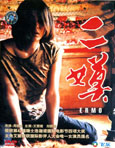 |
Fallen Angels
“Fallen Angels was originally planned as one section of director Wong Kar-Wai’s best-known film, Chungking Express, but eventually it grew into its own distinct and delirious shape. In many ways, Fallen Angels may be the better film, a dark, frantic fun-house ride through Hong Kong’s nighttime world. Part of the film is a love story between two people who have barely met: a young, ultra-hip hit man (Leon Lai) and the dreamy operative (Michele Reis) who plans his jobs. Much of the movie is given over to a very strange subplot about a manic mute (Takeshi Kaneshiro) who goes on bizarre nocturnal prowls through a closed food market—like almost everything else in Wong’s films, this is antic, stylish, and oddly touching, all at the same time. It must be said that, also like Wong’s other films, Fallen Angels is fragmented and oblique to the point of occasional incomprehensibility…but then suddenly something wild or wonderful happens, such as the moment when the killer leaves the scene of a spectacular shooting and is promptly waylaid by a cheerful old school chum on a public bus. These coups—whether lyrical, violent, or simply “how on earth did they get that shot?”—are tossed off by Wong and cinematographer Christopher Doyle with all the cool of the hired killer, as though the movie were a cigarette dangling from a pair of oh-so-casual lips. This is exactly why so many otherwise calm critics fell all over themselves in hailing Wong Kar-Wai as one of the most exciting filmmakers of his generation.”—Robert Horton, from Amazon.com
Click here to purchase the DVD. |
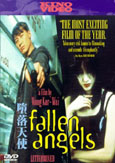 |
Fast Food
“Auggie (Clark Brandon) and his pals are living it up as perpetual college students. When the dean decides the only way to stop their antics is to graduate them, they come up with one final scheme; a risky bank loan to turn a friend’s garage into stiff competition for Wrangler Bob’s fast food chain. When it looks like Bob will win after all, they develop a very special sauce that keeps the crowds coming back because it has the effect of being an aphrodisiac. Bob doesn’t like to lose, so he sends Dixie Love (Traci Lords) to infiltrate the restaurant and find out their secret. The ensuing FDA investigation culminates into a steamy case of disorder in the court!”—from Amazon.com
Click here to purchase the DVD. |
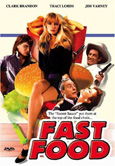 |
Fine Food, Fine Pasties, Open 6 to 9
“A 30 minute film highlighting Sherill’s Restaurant and Bakery in Washington D.C., and how the restaurant influences the community.”—Melissa Hom
|
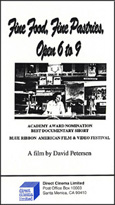 |
Fried Green Tomatoes
“Kathy Bates stars as an unhappy wife trying to get her husband’s attention in this amusing and moving 1991 screen adaptation of Fannie Flagg’s novel Fried Green Tomatoes at the Whistle Stop Cafe. After befriending a lonely old woman (Jessica Tandy), Bates hears the story of a lifelong friendship between two other women (Mary Stuart Masterson and Mary-Louise Parker, seen in flashback) who once ran a cafe in town against many personal odds. The tale inspires Bates to take further command over her life, and there director Jon Avnet (Up Close and Personal), in his first feature, has fun with the film. Bates develops a real attitude toward her thickheaded spouse at home and some uppity girls in a parking lot, but dignity is generally the key to Avnet’s approach with the story’s crucial relationships. Tandy is a joy and clearly loves the element of mystery attached to her character, and Masterson and Parker are excellent in the historical sequences.”—Tom Keogh, from Amazon.com
Click here to purchase the DVD. |
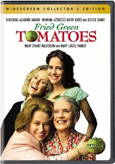 |
The Future of Food
“Surveys show that a large majority of Americans do not want genetically engineered food. So does Europe. Why is it then, that Americans and American farmers are either forced to eat and to grow, or eating and growing without knowing that our food supply is flooded with GMOs? A striking documentary on corporations, the government, and our role to know and to act.”—Melissa Hom
Click here to purchase the DVD. |
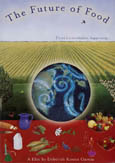 |
Good Burger
“Based on a cable-channel Nickelodeon project, Good Burger teams Kel Mitchell and Kenan Thompson as a contemporary Abbott and Costello team, working a fast-food stand while competing with a major chain outlet right across the street. It’s sight gags and physical humor galore, and while the film is aimed at kids there’s no reason adults can’t enjoy if caught in the right mood.”—Tom Keogh, from Amazon.com
Click here to purchase the DVD. |
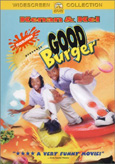 |
Guess Who’s Coming to Dinner?
“Spencer Tracy’s last performance was in this well-meaning, handsome film by Stanley Kramer about a pair of white parents (Tracy and Katharine Hepburn) trying to make sense of their daughter’s impending marriage to an African American doctor (Sidney Poitier). The film has been knocked over the years for padding conflict and stoking easy liberalism by making Poitier’s character in every socioeconomic sense a good catch: But what if Kramer had made this stranger a factory worker? Would the audience still find it as easy to accept a mixed-race relationship? But there’s no denying the drawing power of this movie, which gets most of its integrity from the stirring performances of Tracy and Hepburn. When the former (who had been so ill that the production could not get completion insurance) gives a speech toward the end about race, love, and much else, it’s impossible not to be affected by the last great moment in a great actor’s life and career.”—Tom Keogh, from Amazon.com
Click here to purchase the DVD.
|
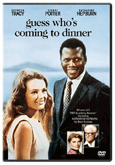 |
Heavy
“Not merely a description of corpulent character Pruitt Taylor Vince, the title refers to the leaden atmosphere hanging over a roadside café and its inhabitants. Writer-director James Mangold finds significance in the details of life, giving this touching story an authenticity that keeps us involved. Liv Tyler brings poignancy to the story as a college dropout who helps awaken the introverted and depressed Vince. Unfortunately, this fascinating character study is too often undermined by direction slow enough to be leaden. Happily, even the most stolid camera work cannot undermine the desires and insecurities of the main character, a man yearning for a full life but too afraid too take a chance.”—Rochelle O’Gorman, from Amazon.com
Click here to purchase the DVD. |
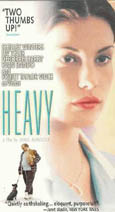 |
Jamón, Jamón
“Class, sex, and food are the obsessions of this Spanish comedy drama, an international hit from writer and director J.J. Bigas Luna that plays like a cross between the lusty Like Water for Chocolate (1992) and the early work of Pedro Almodovar. In a small town in Spain’s arid Monegros region, young underwear factory executive Jose Luis (Jordi Molla) falls in love with the beautiful Silvia (Penelope Cruz), a worker on the shop floor. When Silvia becomes pregnant, Jose Luis wants to marry her, but his mother Conchita (Stefania Sandrelli), the factory owner, is appalled by the thought of her son marrying a working-class girl, especially one who is the daughter of a prostitute, Carmen (Anna Galiena). So Conchita hatches a scheme to woo Silvia away from her son by hiring handsome model Raul (Javier Bardem) to seduce the girl. A ham factory employee with aspirations to become a bullfighter, Raul’s charms work their magic on both Silvia and Conchita, much to the dismay of Jose Luis, who seeks comfort in the arms of his sometime lover, Carmen. Jamon Jamon (1992) was the winner of a Silver Lion at the Venice Film Festival.”—from Amazon.com
Click here to purchase the DVD. |
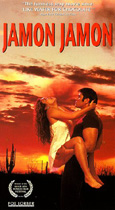 |
The Last Supper
“Painted in mile-wide strokes of black satirical comedy, The Last Supper turns intolerance into a parlor trick, then repeats it ad nauseam in case we missed the joke. Still, redundancy can be fun when applied to the premeditated murder of right-wing extremists by self-righteous left-wing zealots; director Stacy Title is an equal-opportunity offender, never taking sides. The grisly high jinks commence when a truck-driving, child-molesting, Hitler-loving ex-Marine (Bill Paxton, acing the role) is accidentally killed while dining with a clutch of snobby liberal grad students, played with uniform excellence by Cameron Diaz (showing early promise), Ron Eldard, Courtney B. Vance, Annabeth Gish, and coproducer Jonathan Penner. Having acquired a taste for blood, the wine-poisoning liberals stage “last suppers” with hand-picked targets (Charles Durning, Mark Harmon, Jason Alexander, and ultimately Ron Perlman), eventually attracting a suspicious sheriff (fine work by SNL alumnus Nora Dunn). It’s got all the subtlety of a pile-driver, but The Last Supper craftily defends free speech by exposing its most vicious violations.”—Jeff Shannon, from Amazon.com
Click here to purchase the DVD. |
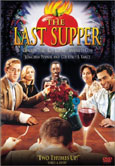 |
La Grand Bouffe
“‘Bouffe’ means ‘comic opera’ and bouffer is French slang for “to eat,” creating a dramatic comedy about friends committed to a suicide through excessive food, alcohol, and sex.”—Melissa Hom
Click here to purchase the DVD. |
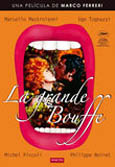 |
The Legend of Alfred Packer
“An eerie movie based on the true story of a man who led a group of hopeful gold-miners to a site in Colorado in 1873. The cold winter strands them from civilization and as rations run out, the only survivor, Alfred Packer survived by resorting to cannibalism.”—Melissa Hom
Click here to purchase the VHS tape.
|
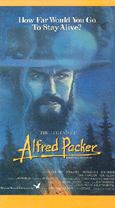 |
Life is Sweet
“Wendy and Andy with twins Natalie and Nicola, live out their family conflict and love on the screen. With a bit of waitressing, cooking, procrastination, bulimia, unemployment, perkiness, and unhappiness mixed in the family, perhaps eclectic ones make for the sweetest ones.”—Melissa Hom
Click here to purchase the DVD. |
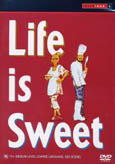 |
Like Water for Chocolate
“Expect to be very hungry (and perhaps amorous) after watching this contemporary classic in the small genre of food movies that includes Babette’s Feast and Big Night. Director Alfonso Arau (A Walk in the Clouds), adapting a novel by his former wife, Laura Esquivel, tells the story of a young woman (Lumi Cavazos) who learns to suppress her passions under the eye of a stern mother, but channels them into her cooking. The result is a steady stream of cuisine so delicious as to be an almost erotic experience for those lucky enough to have a bite. The film’s quotient of magic realism feels a little stock, but the story line is good and Arau’s affinity for the sensuality of food (and of nature) is sublime. You might want to rush off to a good Mexican restaurant afterward, but that’s a good thing.”—Tom Keogh, from Amazon.com
Click here to purchase the DVD. |
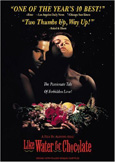 |
Meals on Wheels
“A truly international production, Wheels on Meals teams up Jackie Chan, Sammo Hung, and Yuen Biao in a comedic-action-crime caper that includes what some consider one of the greatest fight scenes ever filmed. Directed by Hung, the movie takes place in Spain, marking the first Jackie Chan vehicle set in a non-Asian location. Chan and Biao play two lunch-truck restaurateurs who are trying to make a living selling egg rolls and hamburgers in the busy squares of Barcelona. Hung is a novice private investigator searching for a beautiful pickpocket named Sylvia (Lola Ferner) whose thieving teams her up with Chan and Yuen. Sylvia is kidnapped after she discovers she is actually a wealthy heiress, and that’s when Chan, Yuen, and Hung join forces to free her and kick some bad guys’ butts. Wheels on Meals is lighthearted fun with stunts and action scenes (including skateboarding tricks and a scene in which Chan and Yuen face off against a motorbike gang) that simply reaffirm the stars’ physical and comic talents. The celebrated fight scene is a matchup between Chan and international kickboxing champion Benny “the Jet” Urquidez. The intensity of their scenes together spurred rumors of a rivalry beyond the film. Whether or not this was true, the two paired up again four years later in Dragons Forever. As for the nonsensical title, one theory claims the film’s distributor (Golden Harvest) had little success with films whose titles started with “m” so they simply switched the two words around. The DVD boasts subtitles in eight different languages but does not include the “blooper” outtakes that frequently accompany Chan’s films.”—Shannon Gee, from Amazon.com
Click here to purchase on DVD.
|
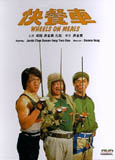 |
My Dinner with Andre
Wallace Shawn and Andre Gregory, apparently playing themselves, share their lives over the course of an evening meal at a restaurant. Gregory, a theater director from New York, is the more talkative of the pair. He relates to Shawn his tales of dropping out, traveling around the world, and experiencing the variety of ways people live, such as a monk who could balance his entire weight on his fingertips. Shawn listens avidly, but questions the value of Gregory’s seeming abandonment of the pragmatic aspects of life.”—from Amazon.com
Click here to purchase the DVD. |
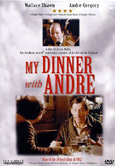 |
Mystic Pizza
“A sweet and sassy comedy about the bonds of sisterhood, Mystic Pizza offers the opportunity to see some solid young actors early in their careers. Three sisters of blue-collar Portuguese descent work in a pizzeria in the coastal town of Mystic, Connecticut. Each has her own unique romantic entanglements. One is the fast girl in town (Julia Roberts), who falls for a rich kid but wonders if she’ll ever be accepted; one is the lifelong local girl (Lili Taylor) in love with her fisherman boyfriend (Vincent D’Onofrio) but scared of what marriage will do to their sex lives; and the youngest sister (Annabeth Gish) dreams of going to Yale but during a summer of baby-sitting has an affair with a married man. Through it all each sister depends on the others regardless of the complications. It’s the alluring charm of the three disparate leads that makes Mystic Pizza the delightful experience it is.”—Robert Lane, from Amazon.com
Click here to purchase the DVD. |
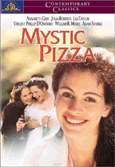 |
A Private Function
“This film won a “Best Stimulator of Hunger” award at the 1947 Cinema and Food Retrospective Festival in Italy. Set in 1947 after the WWII in Britain while meat was still rationed, this satire depicts the devastation of a community when an illegally raised pig meant to honor the princess, is stolen.”—Melissa Hom
Click here to purchase the DVD. |
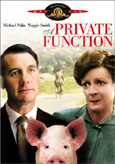 |
Return of the Killer Tomatoes!
“You’re not going to believe this, but Return of the Killer Tomatoes is a genuinely funny movie. Ten years after John DeBello made the frowzy, low-budget Attack of the Killer Tomatoes, he brought the fleshy fruit back for a murderous encore. Like the first film, it works as a parody of horror-movie conventions (and it repeatedly makes fun of itself, Mad-magazine style), but this time the budget is higher. There’s a great, ongoing send-up of product placement, plus a juicy role for the oft-underutilized John Astin, as the evil genius this kind of movie needs. Just to keep everything moving, another exploitation film keeps cutting in: Big-Breasted Girls Go to the Beach and Take Their Tops Off. It ain’t high art, but this movie knows its audience. A young George Clooney plays one of the heroes.”—Robert Horton, from Amazon.com
Click here to purchase the DVD. |
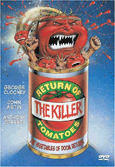 |
The Road to Wellville
“This wrong-headed adaptation of the very funny (and scatological) novel by T. Coraghessan Boyle was written and directed by Alan Parker, who doesn’t seem to have much of a clue. It’s not a botch, just a movie that hammers its efforts at humor too hard. The focus is split between three story lines: the life of cereal tycoon John Kellogg (Anthony Hopkins with buck teeth), who has created a health spa for the wealthy that focuses on regular cleansing of the digestive tract (as well as applications of electricity); the troubles of an unhappy young couple (Matthew Broderick and Bridget Fonda), who come to the spa hoping to cure their marital ills (Broderick gets the worst of the deal); and the efforts of a young hustler (John Cusack), who is trying to break into the breakfast-cereal business but gets taken by an even bigger hustler (Michael Lerner). There are subplots about Kellogg’s children but they add little. For all the doo-doo and enema jokes, the joys of this movie are distinctly scattered.”—Marshall Fine, from Amazon.com
Click here to purchase the DVD. |
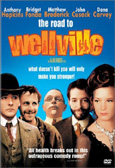 |
Satyricon
“Two student friends in first century Rome under Nero’s reign divide themselves over a common love interest – only to cause a divide in the earth with an earthquake. Their finger-licking hedonistic travels lead them to adventure and encounters with the demi-divine.”—Melissa Hom
Click here to purchase the DVD. |
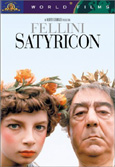 |
The Scent of the Green Papaya
“Watching it is like seeing a poem for the eyes.” That’s how Chicago Sun-Times critic Roger Ebert described this exquisite, Oscar-nominated, French-Vietnamese film from 1993, which begins in the 1950s and ends more than a decade later during the early years of the Vietnam war. The story is set almost entirely in a Saigon house where a 10-year-old orphan girl named Mui arrives to work as a servant. As she grows into a beautiful young woman, Mui is quietly and carefully observant of everything around her, from the scent of green papaya (hence the title) to the relationship between her employers. The film takes its visual cues from Mui’s observations—it’s a placid, soothing film that lingers over the physical and emotional details of its setting and story.
What’s really astonishing about this beautiful film is that director Anh Tran Hung shot it entirely on a soundstage in Paris, but the sights and sounds are so completely convincing that you’d swear the setting is an actual home in Saigon. This remarkable craftsmanship remains invisible to the viewer, and the seductive progression of the story unfolds with exacting visual precision. It’s a film about Mui’s growth and development, but also about her benevolent effect on the world around her. As such, it’s a movie to savor like no other, life affirming and glorious in the memorable depth of its captivating simplicity.”—Jeff Shannon, from Amazon.com
Click here to purchase the DVD. |
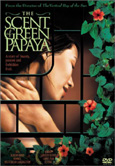 |
Sideways
“With Sideways, Paul Giamatti (American Splendor, Storytelling) has become an unlikely but engaging romantic lead. Struggling novelist and wine connoisseur Miles (Giamatti) takes his best friend Jack (Thomas Haden Church, Wings) on a wine-tasting tour of California vineyards for a kind of extended bachelor party. Almost immediately, Jack’s insatiable need to sow some wild oats before his marriage leads them into double-dates with a rambunctious wine pourer (Sandra Oh, Under the Tuscan Sun) and a recently divorced waitress (Virginia Madsen, The Hot Spot)—and Miles discovers a little hope that he hasn’t let himself feel in a long time. Sideways is a modest but finely tuned film; with gentle compassion, it explores the failures, struggles, and lowered expectations of mid-life. Giamatti makes regret and self-loathing sympathetic, almost sweet. From the director of Election and About Schmidt.”—Bret Fetzer, from Amazon.com
Click here to purchase the DVD.
|
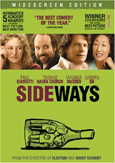 |
Silence of the Lambs
"Hannibal Lechter was a foodie long before Trader Joe's and Whole Foods brought seven dollar canned tuna to the masses. He makes cannibalism seem more like an acquired taste than a crime against humanity, and he single-handedly taught millions how to pair Chianti with fava beans and liver. When it was released in 1991, Silence of the Lambs breathed new life into the horror genre and won five academy awards."—Jake Lemkowitz
Click here to purchase the DVD. |
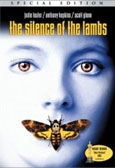 |
Simply Irresistible
“Call it Buffy the Culinary Slayer. Sarah Michelle Gellar, who usually runs around staking vampires and fighting demons, turns cute and cuddly as an aspiring chef in this magical-realist comedy that borrows a page—heck, whole chapters—from Like Water for Chocolate. Out at the market one day, Gellar stumbles on both a magical crab and the babelicious Sean Patrick Flanery who, wouldn’t you know it, is opening up a posh restaurant at Bendel’s department store (actually, the two have been brought together by fairy godfather Christopher Durang). Odd and implausible circumstances give these two cuties more opportunities to moon at each other, and suddenly Gellar’s cooking takes off—turns out all her nicey-nice feelings towards Flanery are going into her cooking, with the help of that quiet but powerful little crab. Gellar’s almost-closed restaurant starts to thrive, and her desserts begin making everyone horny. A cute premise that never really takes off, Simply Irresistible glides along on Gellar’s charisma alone; in her off hours, Buffy certainly can be the lighthearted girl next door, and Gellar works to give some depth to her one-dimensional character. Flanery, though, while appealing at times, plays up his character’s commitment-phobia to irritating degrees. Chock full of fairy-tale elements that never really come together (is that crab really necessary?), Irresistible does boast charming performances by Patricia Clarkson and Dylan Baker as Flanery’s secretary and boss, respectively. However, it’s a little odd to see these two, who scored raves for two serious and harrowing art-house flicks (Clarkson in High Art, Baker in Happiness) doing the light-and-fluffy romantic comedy thing. They’re two of the very few ingredients that occasionally make this soufflé of a movie rise; at the end, however, it’s flat as a pancake.”—Mark Englehart, from Amazon.com
Click here to purchase the DVD. |
 |
Soul Food
“Soul Food is the kind of movie that seems to have been blessed throughout its low-budget production, and it’s got a quality of warmth and charm that fits perfectly with its authentic drama about a large African-American family in Chicago. Twenty-eight-year-old writer-director George Tillman Jr. drew autobiographical inspiration from his upbringing in Milwaukee, and on a well-spent $6.5 million budget he succeeded where similar films (including Waiting to Exhale and How Stella Got Her Groove Back) fell short: He depicts his many characters with such depth and sympathy that, by the time they have weathered several family crises, we’ve come to care and feel for them and the powerful ties that bind them together. As seen through the eyes of Tillman’s young alter ego Ahmad (Brandon Hammond), the film primarily focuses on the rivalries and affections that rise and fall among Ahmad’s mother (Vivica A. Fox) and her two sisters (Vanessa L. Williams, Nia Long). Through them, and through the weekly Sunday dinners cooked with love by their mother, Big Mama (Irma P. Hall), we witness marital bliss and distress, infidelity, success, failure... in short, the spices of life both bitter and sweet. But when Big Mama falls into a diabetic coma, Ahmad watches as his family begins to fall apart without the stability and love that Big Mama provided with every Sunday meal.
Tillman’s touch can be overly nostalgic, melodramatic, and cloyingly sentimental, but never so much that the movie loses its firm grip on reality. As a universal portrait of family life, Soul Food ranks among the very best films of its kind—believable, funny, emotional, and always approaching its characters (well-played by a uniformly excellent cast) with a generous spirit of forgiveness and understanding. As satisfying as one of Big Mama’s delicious dinners, Soul Food is the kind of movie that keeps you coming back for more.”—Jeff Shannon, from Amazon.com
Click here to purchase the DVD. |
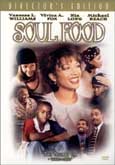 |
Soylent Green
“Charlton Heston seemed fond of starring in apocalyptic science-fiction films in the late 1960s and early ’70s. There was Planet of the Apes, of course, and The Omega Man. But there was also 1973’s Soylent Green, a strange detective film (based on Harry Harrison’s Make Room! Make Room!) set in 2022 and starring Heston as a Manhattan cop trying to solve a murder in the overpopulated, overheated city. His roommate (a necessity in the overcrowded metropolis), played by Edward G. Robinson, tries telling him about a better time on Earth before there were no more resources or room left; but Heston doesn’t care. Directed by Richard Fleischer (The Vikings), the film has a curious but largely successful mix of mystery and bleak futuristic vision, somewhat like Blade Runner but without the extraordinary art direction. This was Robinson’s last film and he’s easily the best thing about it; his final scene seems terribly appropriate in retrospect. Joseph Cotten makes an appearance as the man whose murder results in the revelation of a shocking secret.”—Tom Keogh, from Amazon.com
Click here to purchase the DVD. |
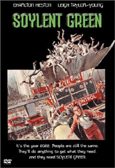 |
Spicy Love Soup
“A huge hit as a refreshingly young and modern movie in Chinese cinema, the film centers on five different love relationships – each with their individual warmth and quirks, similar to Love Actually.”—Melissa Hom |
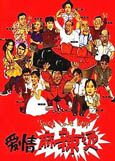 |
Supersize Me
“Filmmaker Morgan Spurlock, rejected five times by the USC film school, won the best director award at the 2004 Sundance Film Festival for this alarmingly personal investigation into the health hazards wreaked by our fast food nation. Under extensive medical supervision, Spurlock subjects himself to a steady diet of McDonald’s cuisine for 30 days just to see what happens. In less than a week, his ordinarily fit body and equilibrium undergo dark and ugly changes: Spurlock grows fat, his cholesterol rockets north, his organs take a beating, and he becomes subject to headaches, mood swings, symptoms of addiction, and lessened sexual energy. The gimmick is too obvious to sustain a feature documentary; Spurlock actually spends most of the film probing insidious ways that fast food companies worm their way into school lunchrooms and the hearts of young children who spend hours in McDonald’s playrooms. French fries never looked more nauseating.”—Tom Keogh, from Amazon.com
Click here to purchase the DVD. |
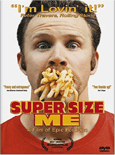 |
Tampopo
"Tampopo means dandelion in Japanese, and the plot of the film is structured much like one. The center of the flower, the main storyline, is about two truckers who stop late one night to get some noodles, and meet a widowed young ramen shop proprietor named Tampopo. Her shop isn’t so great or special, especially to two noodle connoisseurs, which these truckers definitely are. But when one of the truckers gets beaten up, and Tampopo nurses him back to health, he agrees to stay and teach her everything he knows about the art of ramen.
As the truckers and Tampopo embark on an almost spiritual journey to create the ultimate noodle shop, picking up friends and self-knowledge along the way, the film wanders off in many directions. Interspersed throughout this main storyline are a series of small vignettes about food. We see some of the characters from these vignettes again, though most appear only once. The fact that these short films-within-a-film manage to stand on their own emphasizes the fact that this is a movie about more than just the characters in it. It is about the act of eating, and a reminder that by treating what may appear to be mundane with reverence, whether it is food or another person, a rewarding and previously unseen world is revealed."—Jake Lemkowitz
Click here to purchase on VHS. |
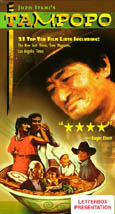 |
Tom Jones
“Winner of four Academy Awards including best picture, director, screenplay, and music, this 1963 adaptation of Henry Fielding’s classic novel is a rousing, bawdy comedy about a young man’s ribald adventures in 18th-century England. Albert Finney is splendidly hilarious in the title role of a charming womanizer who was discovered as an abandoned infant in the bed of Squire Allworthy, a wealthy landowner who named the child Tom Jones and raised him as his own. As a young man, Tom yearns for the comely daughter (Susannah York) of a neighboring squire, but his amorous adventures (including an extended food orgy that becomes the film’s funniest scene) lead him to London and to a duel with a jealous husband. He’s sentenced to hang, but fate intervenes. A hit around the world, the film was expertly written by noted playwright John Osborne, and director Tony Richardson uses a variety of old-style movie techniques to heighten the lusty, good-natured fun. Don’t miss this one!”—Jeff Shannon, from Amazon.com
Click here to purchase the DVD. |
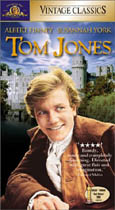 |
Tortilla Soup
“The tantalizing genre of food films—stretching from Babette’s Feast to Big Night and beyond—has a delicious new addition, Tortilla Soup. The food-preparation scenes will make your mouth water. Fortunately, the rest of the movie holds up as well. Hector Elizondo plays Martin, a widowed chef who is losing both his sense of taste and control over his three daughters: Leticia (the always superb Elizabeth Peña), a religious schoolteacher; Carmen (Jacqueline Obradors), a successful but unhappy businesswoman still carrying on an affair with her ex-boyfriend; and Maribel (Tamara Mello), a rebellious teen falling in love with a young Brazilian. When a pushy, nosy, but very sexy widow named Hortensia (Raquel Welch) comes along, the troublesome subcurrents in the family start to surface. Elizondo’s understated gravitas anchors the story, while the three sisters have sex, eat amazing-looking food, and break plates in the kitchen.”—Bret Fetzer, from Amazon.com
Click here to purchase the DVD. |
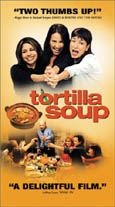 |
Ulee’s Gold
“Director Victor Nunez’s richly photographed Ulee’s Gold drew critical acclaim for Peter Fonda’s and Patricia Richardson’s subtle performances—and premiered as the Festival Centerpiece in 1997’s Sundance Film Festival. Vividly photographed and set amid southern Florida’s tupelo swamps, the film’s narrative hinges on the evolution of a more-than-platonic connection between neighbors Ulysses, Ulee for short (Fonda), and Connie (Richardson). Known for her role on TV’s Home Improvement, Richardson makes a satisfying foray into film with this appropriately smaller role where she manages to hatch out of potential typecasting. Fonda’s independent, stubborn, and reserved Ulee anchors the narrative. He is a bee keeper whose struggling small business is all that keeps him focused in the wake of his wife Penelope’s death, his daughter-in-law Helen’s (Christine Dunford) drug addiction, and the de facto single-parent obligations he takes on to his adolescent granddaughters. (Notice the Homeric references.) Soon the plot twists, however, in the sociopathy of Eddie and Ferris, friends of Ulee’s jailed son—a sociopathy that is also the impetus for the family to confront its dysfunction and for Connie and Ulee to see more in each other than mere neighborliness. Thankfully, Nunez foregoes the bathos of a Hollywood ending and leaves us satisfied on one hand with Helen’s healing and Eddie’s justice but uncertain, though hopeful, about Ulee’s next step.”—Erik Macki
Click here to purchase the DVD. |
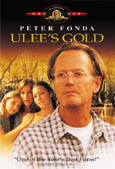 |
Vatel
“Starring Uma Thurman (THE AVENGERS, PULP FICTION), Gerard Depardieu (THE CLOSET), and Tim Roth (ROB ROY), VATEL is based on the true story of an ordinary man, a decadent king, and the woman caught between them! In the west of France, Prince de Conde has a scheme to save his bankrupt province: he’ll regain the favor of King Louis XIV with a weekend of spectacle and merriment. The plan’s success rests with Vatel (Depardieu), the one man who can deliver sumptuous food, elaborate amusements, and all-out decadence fit for this king. But in the midst of it all, Vatel catches the eye of the beautiful Anne (Thurman) ... and places himself in direct competition with the King! Visually stunning and grandly entertaining, it’s a motion picture you must see to believe!”—from Amazon.com
Click here to purchase on DVD.
|
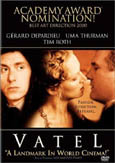 |
A Walk in the Clouds
“Keanu Reeves is completely wooden in this romantic misfire by Alfonso Arau (Like Water for Chocolate). Reeves plays a World War II vet who hits the road as a traveling salesman and agrees to help a desperate, pregnant woman (Aitana Sanchez-Gijon)—who is afraid to let her father (Giancarlo Giannini) see her condition—by pretending to be her husband. Most of the story takes place in the old man’s vineyard, and Arau makes a life of swollen fruit, grape-stomping, sunlight, and tan flesh that looks amazingly erotic. But there are plenty of sillier distractions, such as the sight of farm hands chasing insects with flapping gossamer wings attached to their arms. Reeves is terribly self-conscious, while stalwart Anthony Quinn is memorable as the damsel’s benevolent grandfather.”—Tom Keogh, from Amazon.com
Click here to purchase the DVD. |
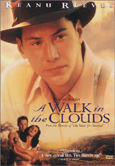 |
The Wedding Banquet
“This 1993 international hit by Ang Lee is a funny and poignant story of a gay, Taiwanese-American man who goes to some lengths to fool his visiting family that he’s actually straight. The results are far more complicated and entertaining than anyone could have guessed. The film seems all the more rich now since Lee has become a major Hollywood director: that same sensitivity and mild bemusement he brought to such stories of manners as Sense and Sensibility and The Ice Storm in recent years are in full bloom in this earlier work.”—Tom Keogh, from Amazon.com
Click here to purchase the DVD. |
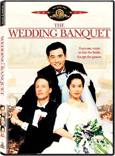 |
Werner Herzog Eats His Shoe
Werner Herzog Eats His Shoe is a short documentary made in 1980 by Les Blank, the prolific American filmmaker. True to its title, the movie features the acclaimed German born director, actor and screenwriter, Werner Herzog, eating his own shoe. Why, you may ask? Because of a bet, of course.
In 2003, The Guardian listed Errol Morris as the seventh greatest director in the world. But a little under thirty years ago, Morris was just a failed philosophy student with a propensity for sneaking into movies. It was through his friendship with Herzog that Morris first became involved with filmmaking.
Werner Herzog Eats His Shoe has two origin stories. In the first, Herzog and Morris got into an argument, and Herzog told Morris that that he would never finish his documentary, Gates of Heaven. Herzog claimed that he was so sure of Morris's imminent failure, if the film ever was completed, Herzog would eat his own shoe. In Herzog’s version of the story, the great German director meant to encourage the young protégé by telling him, "You are going to make a film. And the day I am going to see the film in a theatre I will eat the shoes I am wearing.”
No matter which story you prefer, Herzog was true to his word. When Morris’s Gates of Heaven premiered, Herzog boiled his own shoe, and ate it at the premier. Werner Herzog Eats His Shoe is worthwhile not only as a pop culture curiosity, but also for the monologue on film and life that Herzog gives to the audience as he dines.—Jake Lemkowitz
Click here to purchase the DVD. |
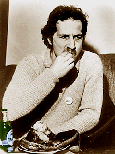 |
What’s Cooking?
“At first glance, What’s Cooking? looks like it was dreamed up by some politically correct screenwriting committee: a series of overlapping stories that intercut among four families (one Hispanic, one Vietnamese, one African American, one Jewish) all preparing for Thanksgiving dinner. But what could be toothless and smarmy is made gripping and genuinely affecting by a mixture of observant writing, fluid direction, and a truly superb ensemble of actors, including Mercedes Ruehl, Alfre Woodard, Joan Chen, Julianna Margulies, Kyra Sedgewick, Dennis Haysbert, and a host of less well known but just as capable others. The script is a marvel of orchestration: small annoyances blossom into fierce conflicts, secrets are deftly revealed, and sanctimoniousness is subtly punctured. The acute but sympathetic portrait of family stress and tension is layered with quiet observations about race and class, as well as the capacity for tolerance and forgiveness. It’s recently become a cliché to have characters express themselves through food (examples include Soul Food, Big Night, and Eat Drink Man Woman), but What’s Cooking? turns food into a witty exploration of culture as everyone prepares their turkeys in entertainingly different ways—this is not a movie to watch on an empty stomach. Warm without false sentiment, What’s Cooking? is deeply enjoyable.”—Bret Fetzer, from Amazon.com
Click here to purchase on DVD. |
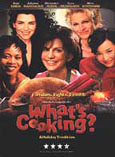 |
Who’s Killing the Great Chefs of Europe?
“The culinary community in Europe races to solve a chain of mysterious homicides in which the murderer kills a chef using the same methods and preparation as the chef’s signature dish.”—Melissa Hom
Click here to purchase the VHS tape. |
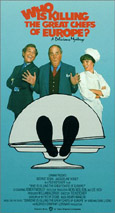 |
Willy Wonka and the Chocolate Factory
“Having proven itself as a favorite film of children around the world, Willy Wonka & the Chocolate Factory is every bit as entertaining now as it was when originally released in 1971. There's a timeless appeal to Roald Dahl's classic children's novel, which was playfully preserved in this charming musical, from the colorful carnival-like splendor of its production design to the infectious melody of the "Oompah-Loompah" songs that punctuate the story. Who can forget those diminutive Oompah-Loompah workers who recite rhyming parental warnings ("Oompah-Loompah, doopity do...") whenever some mischievous child has disobeyed Willy Wonka's orders to remain orderly? Oh, but we're getting ahead of ourselves ... it's really the story of the impoverished Charlie Bucket, who, along with four other kids and their parental guests, wins a coveted golden ticket to enter the fantastic realm of Wonka's mysterious confectionery. After the other kids have proven themselves to be irresponsible brats, it's Charlie who impresses Wonka and wins a reward beyond his wildest dreams. But before that, the tour of Wonka's factory provides a dazzling parade of delights, and with Gene Wilder giving a brilliant performance as the eccentric candyman, Wonka gains an edge of menace and madness that nicely counterbalances the movie's sentimental sweetness. It's that willingness to risk a darker tone--to show that even a wonderland like Wonka's can be a weird and dangerous place if you're a bad kid--that makes this an enduring family classic.”—Jeff Shannon, from Amazon.com
Click here to purchase the DVD. |
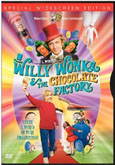 |
Woman on Top
“Woman on Top pretends to be your standard fish-out-of-water romantic comedy laced with touches of magic realism. When you break it down and look at its elements, however, it turns out to be different than most, which is good. Hot Spanish star Penélope Cruz (All About My Mother) plays Isabella Oliveira, a Brazilian chef who falls madly in love with, and marries, a dashing waiter (Murilo Benício). Throughout her life she’s been a victim of motion sickness, and the only way she can overcome it is by being in control, whether it’s driving or being on top during sex. Her husband starts to feel that as a threat to his Latin masculinity, and when he steps out on her, she catches him. She decides to leave Brazil and stop loving him, ending up in San Francisco with an old friend (Harold Perrineau Jr.), now a drag queen. There she meets a nice guy-television producer (Mark Feuerstein), who sets her up with her own cooking show. Normally in this kind of movie his character would be the perfect antidote for her heartbreak, but he ends up more seduced by the success of her cooking show than by her. When her husband shows up, she becomes trapped in a love triangle where both men are deeply flawed. Can she forgive her husband’s infidelity and fall back in love with him? Forget the answer. The fact that the question is being asked separates Woman on Top from the other broad, romantic comedies that share its tone. Plus it’s chock-full of seductive Brazilian music.”—Andy Spletzer, from Amazon.com
Click here to purchase the DVD.
|
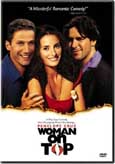 |
| |
|

© Copyright 2005-2026 Lifestyle Direct, Inc. All rights reserved. Images are the copyright of their individual owners.
|






















































































